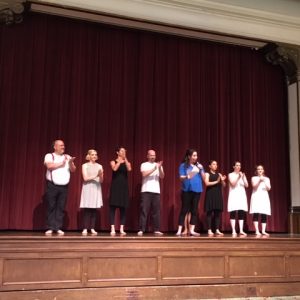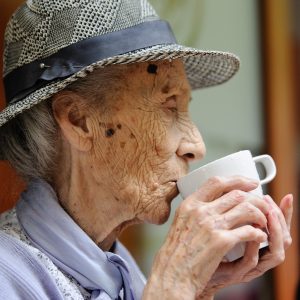 Dementia Friendly Fort Worth recently sponsored Remember This, a participatory performance experience by the Texas Tech University School of Theatre and Dance. Created and produced by Dr. Tyler Davis, Genevieve Durham DeCesaro, Rachel Hirshorn-Johnston, and Dr. Annette Sobel, Remember This is about changing the conversation about dementia.
Dementia Friendly Fort Worth recently sponsored Remember This, a participatory performance experience by the Texas Tech University School of Theatre and Dance. Created and produced by Dr. Tyler Davis, Genevieve Durham DeCesaro, Rachel Hirshorn-Johnston, and Dr. Annette Sobel, Remember This is about changing the conversation about dementia.
Remember This is poignant, inspiring, humorous and creative.
Remember This is designed to spotlight conversations about and perceptions of dementia by using a myriad of performance approaches, including dance, improv comedy, and scripted theatre taken directly from interviews with people living with and around the disease.
The creators worked to research and publicize the humanity, as opposed to solely the tragedy of the disease, by approaching it as a set of interwoven stories. Remember This is designed to promote a larger and louder public conversation about people living with dementia as well as the communities (e.g. caregivers, families, community business owners, hospitals, etc.) who care for and serve them.
The creative ensemble that performed, several who had loved ones with dementia, was simply an amazing work of art. Hats off to the visionaries, researchers, and creative minds of Remember This. Having young people share in the dialogue is expanding the generational reach of dementia.
Thank you to Dementia Friendly America, of which Dementia Friendly Fort Worth is a part of, Alzheimer’s Association and many others who are changing the conversation to the broader public about dementia – how to better understand dementia, openly accept persons living with dementia as vital members of the community, and to help those caring for persons with dementia. And finally, to provide more funding for training, support, resources, and research – all urgently needed to meet the fast-growing numbers of persons living with dementia and those caring for them, in the U.S. and throughout the world.
Pam Brandon is President/Founder of AGE-u-cate Training Institute and a passionate advocate for older adults and those who serve them. Pam is the creator of the internationally acclaimed Dementia Live® simulation and awareness training program.
 Until a miracle cure is found to stop, reverse or drastically slow down the aging process, the news flash of the day is that we will all leave this earth someday. In our anti-aging driven society of wrinkle reducers and body re-shaping, the fact is that all of us are, shall I say it – AGING! The question is not that we are aging, but can we age well through the challenges of aging?
Until a miracle cure is found to stop, reverse or drastically slow down the aging process, the news flash of the day is that we will all leave this earth someday. In our anti-aging driven society of wrinkle reducers and body re-shaping, the fact is that all of us are, shall I say it – AGING! The question is not that we are aging, but can we age well through the challenges of aging? Quite simply, the definition of personhood is the quality or condition of being an individual person. At the core of personhood is the self- who we are are, our values and beliefs. It’s who makes us who we are. Being able to recognize the “self” of personhood is key to understanding and practicing person-centered care for persons living with dementia.
Quite simply, the definition of personhood is the quality or condition of being an individual person. At the core of personhood is the self- who we are are, our values and beliefs. It’s who makes us who we are. Being able to recognize the “self” of personhood is key to understanding and practicing person-centered care for persons living with dementia. Every fall, teachers ask, “what did you do on your summer vacation?” Summer vacations are a rich tradition for many people. But as our loved one ages, memories of family trips — and the hopes of them continuing — seem to fade. As July turns the page into August, summer’s end appears too soon on the horizon, especially if what used to be your favorite family vacation is no longer do-able. Or is it? How do you vacation with — or do you need a respite from — your loved one with dementia?
Every fall, teachers ask, “what did you do on your summer vacation?” Summer vacations are a rich tradition for many people. But as our loved one ages, memories of family trips — and the hopes of them continuing — seem to fade. As July turns the page into August, summer’s end appears too soon on the horizon, especially if what used to be your favorite family vacation is no longer do-able. Or is it? How do you vacation with — or do you need a respite from — your loved one with dementia?